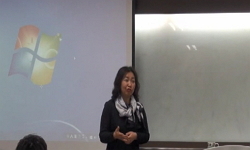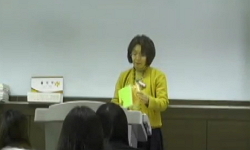The purpose of the thesis is to investigate the developmental process of essays on Dong-wha(story for children) of Kim Yo-sup who was a writer, critic, and scholar in the area of literature for children, and how the genre of Dong-wha came to secure it...
http://chineseinput.net/에서 pinyin(병음)방식으로 중국어를 변환할 수 있습니다.
변환된 중국어를 복사하여 사용하시면 됩니다.
- 中文 을 입력하시려면 zhongwen을 입력하시고 space를누르시면됩니다.
- 北京 을 입력하시려면 beijing을 입력하시고 space를 누르시면 됩니다.
https://www.riss.kr/link?id=T9647248
- 저자
-
발행사항
서울 : 동국대학교 대학원, 2002
- 학위논문사항
-
발행연도
2002
-
작성언어
한국어
- 주제어
-
KDC
813.5 판사항(4)
-
발행국(도시)
서울
-
형태사항
55p. ; 26cm.
-
일반주기명
참고문헌: p. 48-52
- DOI식별코드
- 소장기관
-
0
상세조회 -
0
다운로드
부가정보
다국어 초록 (Multilingual Abstract)
Lots of Dong-wha books are being published and the vocablary, Dong-wha also is used widely, but it does not take a clear position yet. This is attributed to the circumstances that at first Dong-wha was defined as "the stories for the children" in the 1920s when the first Dognwha book was released, and resultingly considered as an area of "literature for children" which names the literature of "needed to the children" and "suitable to the children".
The fact that Dong-wha is an area of literature for children implies a problem that how the two objects, "literature" which names the category of creative and imaginary writings and "children" who, unlike the adults, premises cautious education and protection, could be combined. Especially, one question has been raised ceaselessly that whether or not the identity of literature considered as having an aesthetic autonomy which will not interfered by moral and commercial aims would be damaged.
Since around 1940s, publishing of literature for children became difficult as numbers of literary magazines were discontinued, but after independence from Japan, new magazines were founded and separate volumes were published, resultingly far more works than ever before were released. But, the writers of literature for children of the day were worried out the aesthetic value of literature for children itself, pointing out that quantitative increase of works failed to go to qualitative increase.
According to them, the works of the day were excessively popular in its nature and telling just presentational things only on the premise of the nostalgia of adults rather than the realistic features of the children. They set forth that those style is apposed to the true nature of Dong-wha as well as literature for children, but couldn't leave any products to sustain their assertion. Kim, Yo-sup, one of the writers of literature for children, basically agreed to other writers' recognition on the problems of the works of literature for children of the day. And, he thought that literature for children could solve the problems by securing ultimately a free position from the other conditions except aesthetic aim.
Kim, who had written himself already lots of Dong-wha pieces, took notice of the genre of Dong-wha, and developed his suggestions. He revealed that Dong-wha of the day having the author of the story is the genre succeeding to the genealogy of fairy tale which recorded the oral legends. According to him, fairy tales is the genre which has supernatural and non-realistic "marvellous" elements, and wild "vitality", the vigorous challenge spirit toward the life. He suggested that present day Dong-wha should demonstrate its acting power challenging actively to the problems occurring in reality, keeping away properly from the realistic logistics, by accepting the two elements.
The chance that his above suggestion was revealed to more whole surface lied in his attention toward the "fantasy" as proper to Dong-wha. Kim emphasized that fantasy is composed of imagination as opposed to rational and logical thought, and pointed out that a space beyond the value system of reality could be formed through the fantasy. This assertion paved the ground on which the genre of Dong-wha, keeping away from practical goal, could be faithful to its aesthetic goal, with the help of fantasy which keeps away form realistic value system.
But, it should not be overlooked that Kim's fantasy paid attention to was a kind of methodological and ideal concept which could be defined through the contrast with realistic logistics. Thus, there is a risk that the value or the definition of Dong-wha he imposed is estranged from realistic position, or that the function of fantasy could do dual role of solidification of realistic logistics without disclosure and purification through the distance from reality system.
The purpose of the thesis is to investigate the developmental process of essays on Dong-wha(story for children) of Kim Yo-sup who was a writer, critic, and scholar in the area of literature for children, and how the genre of Dong-wha came to secure its literary and genre value.
Lots of Dong-wha books are being published and the vocablary, Dong-wha also is used widely, but it does not take a clear position yet. This is attributed to the circumstances that at first Dong-wha was defined as "the stories for the children" in the 1920s when the first Dognwha book was released, and resultingly considered as an area of "literature for children" which names the literature of "needed to the children" and "suitable to the children".
The fact that Dong-wha is an area of literature for children implies a problem that how the two objects, "literature" which names the category of creative and imaginary writings and "children" who, unlike the adults, premises cautious education and protection, could be combined. Especially, one question has been raised ceaselessly that whether or not the identity of literature considered as having an aesthetic autonomy which will not interfered by moral and commercial aims would be damaged.
Since around 1940s, publishing of literature for children became difficult as numbers of literary magazines were discontinued, but after independence from Japan, new magazines were founded and separate volumes were published, resultingly far more works than ever before were released. But, the writers of literature for children of the day were worried out the aesthetic value of literature for children itself, pointing out that quantitative increase of works failed to go to qualitative increase.
According to them, the works of the day were excessively popular in its nature and telling just presentational things only on the premise of the nostalgia of adults rather than the realistic features of the children. They set forth that those style is apposed to the true nature of Dong-wha as well as literature for children, but couldn't leave any products to sustain their assertion. Kim, Yo-sup, one of the writers of literature for children, basically agreed to other writers' recognition on the problems of the works of literature for children of the day. And, he thought that literature for children could solve the problems by securing ultimately a free position from the other conditions except aesthetic aim.
Kim, who had written himself already lots of Dong-wha pieces, took notice of the genre of Dong-wha, and developed his suggestions. He revealed that Dong-wha of the day having the author of the story is the genre succeeding to the genealogy of fairy tale which recorded the oral legends. According to him, fairy tales is the genre which has supernatural and non-realistic "marvellous" elements, and wild "vitality", the vigorous challenge spirit toward the life. He suggested that present day Dong-wha should demonstrate its acting power challenging actively to the problems occurring in reality, keeping away properly from the realistic logistics, by accepting the two elements.
The chance that his above suggestion was revealed to more whole surface lied in his attention toward the "fantasy" as proper to Dong-wha. Kim emphasized that fantasy is composed of imagination as opposed to rational and logical thought, and pointed out that a space beyond the value system of reality could be formed through the fantasy. This assertion paved the ground on which the genre of Dong-wha, keeping away from practical goal, could be faithful to its aesthetic goal, with the help of fantasy which keeps away form realistic value system.
But, it should not be overlooked that Kim's fantasy paid attention to was a kind of methodological and ideal concept which could be defined through the contrast with realistic logistics. Thus, there is a risk that the value or the definition of Dong-wha he imposed is estranged from realistic position, or that the function of fantasy could do dual role of solidification of realistic logistics without disclosure and purification through the distance from reality system.
목차 (Table of Contents)
- [목차]
- Ⅰ. 서론 = 1
- Ⅱ. 아동문학과 '문학성'의 추구 = 8
- 1. 미달된 문학으로서의 아동문학과 관념적인 아동관 = 8
- 2. 어른을 위한 동화와 '문학성'의 추구 = 15
- [목차]
- Ⅰ. 서론 = 1
- Ⅱ. 아동문학과 '문학성'의 추구 = 8
- 1. 미달된 문학으로서의 아동문학과 관념적인 아동관 = 8
- 2. 어른을 위한 동화와 '문학성'의 추구 = 15
- Ⅲ. 동화 장르의 의미와 환타지 = 22
- 1. '경이'와 '생명력'의 장르로서의 동화 = 22
- 2. 환타지를 통한 '문학성'의 획득과 그 한계 = 29
- 2-1. 현실변혁적 도구로서의 환타지 = 29
- 2-2. 환타지의 교훈적 환원 = 35
- Ⅳ. 결론 = 44
- 참고문헌 = 48
- Abstract = 53











